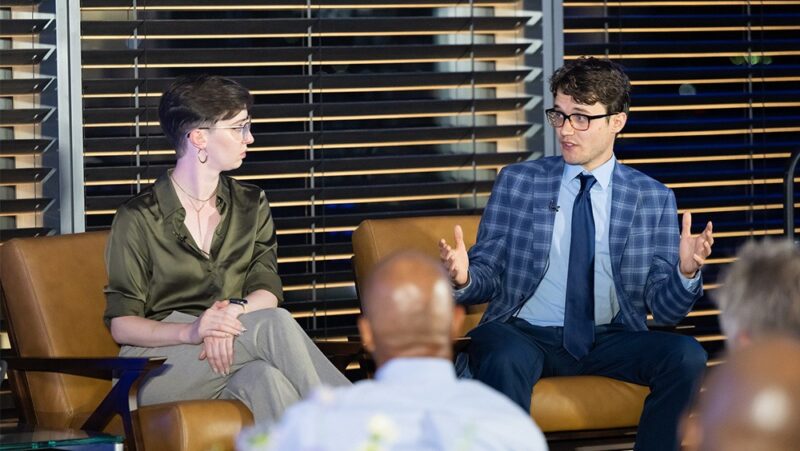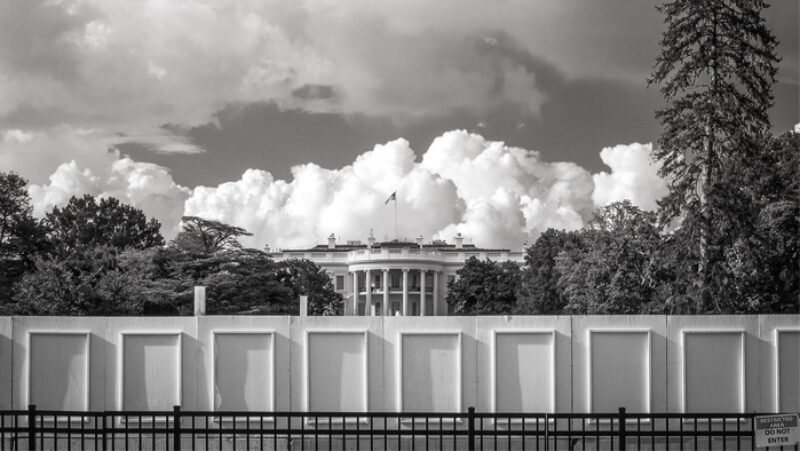Local Journalists Highlight Current First Amendment Issues

The First Amendment guarantees five freedoms, yet most people in the U.S. can’t name them all: religion, speech, press, assembly and petition. Religion and speech are those most often in the news when they come up in Supreme Court decisions.
Through a collaboration with Journalism Funding Partners, the Freedom Forum is helping to highlight more coverage about First Amendment issues and how they affect all people in everyday events – beyond the big Supreme Court headlines.
Since fall 2022, Angele Latham has covered First Amendment issues for the USA TODAY Network, based at The Tennessean in Nashville. Latham has deep Tennessee roots and previously reported for and edited newspapers in Jackson and Selmer, Tenn.
Douglas Soule recently began work as a First Amendment reporter with the USA TODAY Network, focused on Florida and based in Tallahassee. Soule hails from West Virginia and was one of the Freedom Forum’s 2016 Free Spirits, a program that brings high school juniors to Washington, D.C., each year to learn about journalism and the First Amendment.
“Through their reporting, Douglas and Angele are highlighting the many ways the First Amendment is relevant to the everyday lives of people in their communities,” said Jan Neuharth, chair and CEO of the Freedom Forum. “Enabled by our partnership with Journalism Funding Partners, their pioneering work is a model for how we aim to foster First Amendment freedoms for all Americans.”
How do these two journalists think about their roles reporting on First Amendment issues, and what drew them to journalism?
Here's what they said. (Answers have been edited for length and clarity.)
What drew you to journalism?
DOUGLAS SOULE: As a child, I remember scooping the newspaper off the yard on weekend mornings, sprinting inside and orating a story or two from the top of the stairs. Now that I’m closer to the age of my parents at the time than my boyhood self who held a newspaper almost as big as I was, I can only empathize with what it was like to be woken up by my high-pitched recitation. I loved the crinkle of paper between my fingers as I pressed the organized blocks of the words, building off one another like Legos. I had little understanding of the meaning in the words, but I loved the sense of power the telling of them had, echoing down the banister and out through the screen door. While the news industry is slowly moving away from the print product and all its crinkles, that power hasn’t diminished in the slightest. Informing the public and holding the powerful accountable is as important now as then and will continue to be critical far after my career ends.
ANGELE LATHAM: For a long time, I had no idea I wanted to do journalism. Despite doing a plethora of journalism-related hobbies, like cutting out the crime section of my local newspaper at 13 years old to “map out the county crime trends,” and reading every Nancy Drew novel I could get my hands on, I never thought of journalism as an option until I accidentally took a reporting class in college. I took to it immediately and just never looked back.
What about First Amendment coverage on a local/regional level do you enjoy? What is challenging?
DOUGLAS SOULE: Had I not fallen so head over heels for journalism, I would’ve gone into First Amendment law. Its enshrined freedoms are not just a huge part of our laws; they’re a huge part of our lives. The interpretation of those freedoms and how they’re carried out or restricted has profound, resounding impacts on everyone, every day. Explaining this in all its nuance is both an enjoyment and a challenge.
ANGELE LATHAM: I love reporting on First Amendment issues because it touches every person in incredibly unique ways. Everyone has experience with the First Amendment, even if they don’t realize it. In a single week, I can go from broad, overarching stories—like that of the recent protests at the Tennessee State Capitol regarding the expulsion of three House Representatives—to localized, niche stories, like that of book bans at a county high school. They all hold the same weight, because the First Amendment rights have the same importance regardless of the number of people an issue affects. It’s amazing to see constitutional rights at work, and at conflict, in any level of story.
It can be challenging to communicate the nonpartisan importance of the First Amendment, which is one of the biggest reasons I think this coverage holds value. There are a number of issues that I report on that are clear First Amendment concerns but involve hot-topic political groups. This leads to further debates where I often need to explain the precedential effect of First Amendment decisions, and why we should care about these incursions on our rights, regardless of who is at stake.
What do you hope the average person takes away from your coverage of First Amendment issues?
DOUGLAS SOULE: I hope the average reader takes away a better understanding of the First Amendment and all the ways it intersects with their life and their community. It’s way more than you’d think! Most people in the United States understand the First Amendment is important, but most couldn’t list out its five freedoms by memory. It takes a while to get into the weeds of these freedoms and be able to explain what you find in a way that’s easy to understand for those on the go. Having a designated reporter for this topic ensures that the public can get a better understanding of the protections the Founding Fathers deemed so valuable as to list them first in the Bill of Rights. And it ensures that the angles that will be understandably missed by other reporters covering a hundred other things will be my bread and butter.
ANGELE LATHAM: I hope our readers get a better understanding of why the First Amendment is there for all of us. It’s not about whether or not you enjoy someone’s speech or expression. It’s about our right as citizens to express ourselves fully, in a just and equal manner. Our constitutional rights need to be understood and protected, and I hope I adequately cover the many niche ways it is intrinsically involved in our lives.
Learn more about Soule and Latham and read their work here and here.
Find local newspapers near you in the Freedom Forum’s Today’s Front Pages app and sign up for the weekly First Five Newsletter to get First Amendment essentials in your inbox.
The First Amendment Makes News, Every Day
Perspective: White House and Press Corps Should Practice Transparency, Not Prior Review
Related Content

